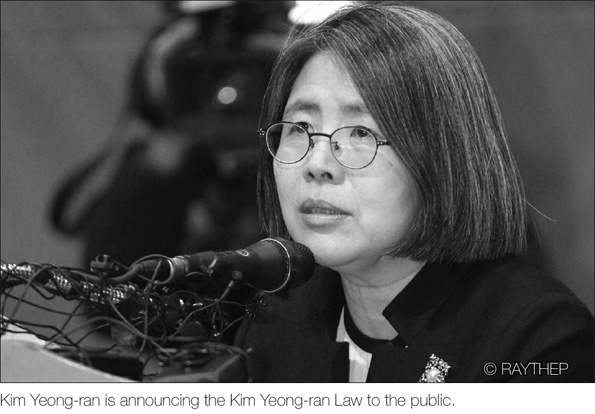
Kim Yeong-ran, a Chairwoman of the Anti-Corruption & Civil Rights Commission, opened to the public a draft of The Improper Solicitation and Graft Act in August 2012, and the Kim Yeong-ran Law was finally implemented last month. It was proposed as a result of the Benz Prosecutor Affair. It started when Lee, the former public prosecutor, fell in love with Choi, a lawyer and former public prosecutor in 2007. Lee received a Benz car, a Chanel bag and other items from Choi. One day, he asked her to investigate a case that he was in charge of, so she gave the information of the case to a specific prosecutor to help Choi. However, Choi’s other secret mistress revealed it all to the authorities, and Choi got in trouble.
The prosecutor’s office organized a team to investigate it, and a trial proceeded. The focus of the judgment was the alleged bribery of Lee by Choi. According to the judgment of the court, the Busan District Court sentenced Lee to three years imprisonment in January 2012. However, the Supreme Court overturned the original judgment and declared that she was innocent because they were intimate, and even though she received goods, she did not get money.
People criticized the Supreme Court for letting her get away with what she had done. Therefore, the Kim Yeong-ran Law was initiated. It gives a criminal penalty if someone does not report when he or she witnesses a subject in government, such as a public official, receiving money or goods regardless of purpose. However, it is still a controversial issue.
There is a problem for universities and student employment. The Kim Yeong-ran Law regulates relationships between faculties and students a lot for the purpose of preventing corruption. For example, if a student already got a job and wanted to be absent from school before graduation, they could do it by submitting the certification of employment. However, according to the Kim Yeong-ran Law, if professors and part-time instructors accept the certificate of employment, it will be considered an illegal request. As universities got confused about students’ early employment, the Ministry of Education sent official documents to major universities on September 26th. The documents said that if the university makes a special provision and implements it, it can give credits to those who are employed early. However, universities have presented various opinions. Some universities said, “We will make alternative classes like an evening school,” and some universities firmly declared that allowing certificates of employment is illegal. Therefore, some students who get a job early can get disadvantages such as cancellation of admission.
Jeong Seok-yeong(’09, Dept. of Chemistry) said, “The Kim Yeong-ran Law is right in the purpose of the preservation of the fundamental purpose of universities, higher education, instead of promoting students to be employed. However, I think nowadays, students need to get a job before graduation and should use the certificate of employment, but it does not grasp this point.”
Lee Seung-jun, who is a professor of the CBNU law school, said, “It is true that I’m worried about the side effects of the Kim Yeong-ran Law, like overcriminalization, unfairness caused by targeted investigations and the absolute authority of police states. Nevertheless, I am counting on the Kim Yeong-ran Law to improve transparency and fairness in our society, and I don’t want university students to be innocent victims due to the ignorance of it.”
By Kim Jae-wan l jw37@cbnu.ac.kr
By Kim Soo-min l sm36@cbnu.ac.kr


 All
All Society & Global
Society & Global






 Kim Jae-wan & Kim Soo-min
Kim Jae-wan & Kim Soo-min











